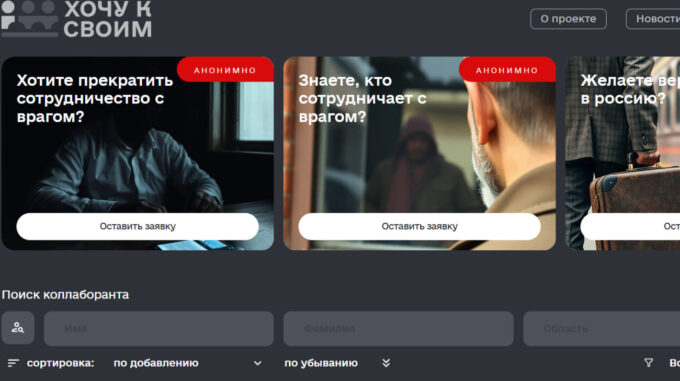As part of Ukraine’s informational front against Russian aggression and collaboration, the public project “Hochu k svoim” (“I Want to My Own”) is gaining increasing momentum

The initiative is focused on identifying and connecting with traitors who cooperate with occupying structures or who plan to leave for Russia. According to the Main Intelligence Directorate of Ukraine, over 300 profiles of Ukrainian traitors have been published on the website of this state initiative, all of whom are searching for opportunities to leave to the aggressor country in exchange for the return of Ukrainian citizens from Russian captivity. Our sources report that the situation with collaborators has become more tense. It has been revealed that Russian authorities have already received information about the desire of more than three hundred Ukrainians, who cooperate with the occupiers or have been their couriers, to move to Russia under the exchange agreement. Official statements indicate that Moscow ignores requests to return its former agents and traitors. Russian special services and propaganda outlets acknowledge that Ukrainian traitors currently hold greater value for them as tools for internal propaganda rather than as potential exchange partners or for further use. At the same time, Putin and his team have a clear position—they do not plan to return collaborators and traitors from Ukraine to Russia. Instead, they focus on using them in propaganda campaigns and creating fake stories to discredit Ukraine. Nevertheless, the "Hochu k svoim" project is already yielding initial results. Notably, one collaborator has already taken advantage of the opportunity to move to Russia, but in doing so, agreed to be part of an exchange that involves Ukrainian prisoners of war in Russian captivity. This serves as a clear signal: Moscow not only gathers information about the number of those wishing to leave but also manipulates this situation for political and informational games. Additionally, according to the Main Intelligence Directorate, five collaborators influenced by the project have already ceased cooperation and switched to support Ukrainian defenders. Civil society plays a significant role in identifying traitors: data indicates that 35 potential collaborators are currently undergoing verification based on reports and statements from attentive and conscious citizens. This points to increased societal engagement and heightened information efforts against enemy agents. Furthermore, 20 Ukrainian citizens—who have no intention of remaining in Ukraine but wish to live in Russia—have submitted applications through a special online form on the "Hochu k svoim" website. These reports are currently being processed by relevant authorities, including the Secretariat of the Ombudsman of the Verkhovna Rada of Ukraine for Human Rights. Overall, the situation demonstrates that Ukrainian society and authorities are increasingly active in combating manifestations of treachery and collaboration, utilizing both state and public mechanisms. The "Hochu k svoim" project has become one of the essential tools in this fight, helping to expose traitors, prevent their activities, and inform about the scale of the so-called "network" of collaborators working with the aggressor. Citizen support and monitoring of potential traitors enable the Ministry of Defense, security agencies, and human rights organizations to more effectively counter Russian intelligence activities and defend Ukraine's sovereignty.

